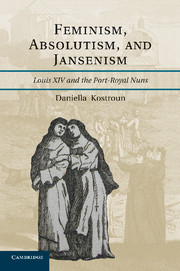Book contents
- Frontmatter
- Contents
- Acknowledgments
- Abbreviations
- Introduction
- 1 Jansenism as a “Woman Problem”
- 2 Controversy and Reform at Port-Royal
- 3 Jansenism's Political Turn, 1652–1661
- 4 The Limits to Obedience, 1661–1664
- 5 A Feminist Response to Absolutism, 1664–1669
- 6 The Unsettled Peace, 1669–1679
- 7 A Royal Victory, 1679–1709
- Conclusion
- Bibliography
- Index
2 - Controversy and Reform at Port-Royal
Published online by Cambridge University Press: 05 August 2011
- Frontmatter
- Contents
- Acknowledgments
- Abbreviations
- Introduction
- 1 Jansenism as a “Woman Problem”
- 2 Controversy and Reform at Port-Royal
- 3 Jansenism's Political Turn, 1652–1661
- 4 The Limits to Obedience, 1661–1664
- 5 A Feminist Response to Absolutism, 1664–1669
- 6 The Unsettled Peace, 1669–1679
- 7 A Royal Victory, 1679–1709
- Conclusion
- Bibliography
- Index
Summary
On March 6, 1643, Angélique Arnauld sent a letter containing both good and bad news to a fellow reformer, M. Louis Macquet, the spiritual director for the nuns of the Annunciation in the city of Boulogne. The good news was that Saint-Cyran had returned to Port-Royal after having spent five years in prison. The bad news was that several Jesuit priests had begun publicly accusing Jansen of heresy: “The Jesuit fathers are crying out from the pulpit in a strange way against M. d'Ypres [Jansen], going so far as to call him an overheated Calvinist, and describing his doctrine as the most pernicious heresy that has ever been taught. Judge for yourself just how far the passions can go.” According to historian Lucien Ceyssens, this letter reveals the broad impact these sermons had on Parisian society. The anti-Jansenist sermons not only resounded in the public churches of Paris but also “made a painful echo even in the most secluded spaces.” By describing Port-Royal as a highly secluded space, Ceyssens referred to the convent's reputation as a successfully reformed Benedictine convent. He also upheld a long tradition of scholarship separating Port-Royal from the Jansenist debates by suggesting the convent was normally sealed off from such echoes and that they slipped through only by unfortunate mishap.
However, scholars such as Ceyssens overlook a dynamic relationship that developed between the Jansenist controversy and the internal operation of the convent in the initial years of the controversy.
- Type
- Chapter
- Information
- Feminism, Absolutism, and JansenismLouis XIV and the Port-Royal Nuns, pp. 51 - 77Publisher: Cambridge University PressPrint publication year: 2011



